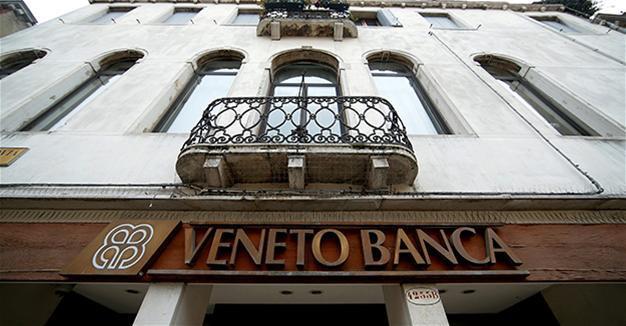Italy to pay up to 17 bln euros to deal with two troubled banks: Gov’t
ROME - Agence France-Presse

REUTERS photo
Italy will pay up to 17 billion euros ($19 billion) to break up two insolvent Venetian banks, which have posed a threat to the country’s banking system, the government announced on June 25.
Both face bankruptcy and European authorities had urged Italy to devise a rescue framework, selling off the good assets of the stricken Banca Popolare di Vicenza and Veneto Banca and transferring their toxic assets to a “bad bank,” essentially financed by Rome.
The move comes less than a month after the EU anti-trust authority approved Italy’s massive rescue of the country’s troubled third-largest bank, Monte dei Paschi di Siena (BMPS), which has been in deep trouble since the worst of the eurozone debt crisis.
The Italian government will stage the two Venetian banks’ rescue with support from the country’s biggest retail bank, Intesa Sanpaolo, which will take up the good assets to protect the banks’ customers and to minimize staff lay-offs.
The European Commission in a statement said it “has approved, under EU rules, Italian measures to facilitate the liquidation of BPVI and Veneto Banca under national insolvency law”.
EU competition commissioner Margrethe Vestager said that Italy considers state aid necessary “to avoid an economic disturbance in the Veneto region.”
She added that “Italy will support the sale and integration of some activities and the transfer of employees to Intesa Sanpaolo”.
Padoan said 4,785 billion euros would be set aside immediately to “maintain capitalization” of Intesa Sanpaolo, which has made that a condition of any cooperation.
For its part Intesa has put one symbolic euro on the table and attached a further string to the deal by insisting its share dividend policy remain unaffected.
“The total resources mobilized could reach a maximum of 17 billion euros -- but the immediate cost to the state is a little more than five billion,” said Finance Minister Pier Carlo Padoan.
“This decree allows the stabilization of the Venetian economy and safeguarding of the economic activity of the Venetian banks,” said Padoan.
Italian Prime Minister Paolo Gentiloni portrayed the move as necessary to shore up the situation of current account holders and ordinary savers as well as of bank workers, in order to bolster “the good health of our banking system.”
The 19-member eurozone has expressed concern at the perilous state of some Italian banks as Rome tries to address piles of risky loans sitting on the books of some of them.
In a statement released late on June 23, the Italian finance ministry said Rome would “adopt necessary measures to ensure banking activity is fully operational, with protection for all current account holders, deposits and senior shares.”
Media reports suggested the bill to the Italian taxpayer from the “bad bank” would be around 10 billion euros.
There is also the issue of some 3,500 to 4,000 bank employees set to lose their jobs as well as associated early retirement costs, La Repubblica reported on June 25.
But Intesa CEO Carlo Messina said late Sunday that there would be no redundancies.
“Our intervention will make it possible to secure more than 50 billion euros of savings entrusted to the two banks and to protect two million customers, including 200,000 companies,” he added.
Earlier this month, the EU anti-trust authority approved the rescue of BMPS, founded in Siena in 1472, making it Italy’s oldest bank.
Rome is set to take a majority stake on a provisional basis to prevent bankruptcy and inject capital in line with EU rules, while limiting the burden for Italian taxpayers after the lender failed to raise funds on the market last year.
In exchange, Rome must accept a drastic EU-approved restructuring plan for BMPS expected to involve mass layoffs.
The European Central Bank said last December that BMPS was short of a staggering 8.8 billion euros in capital.
